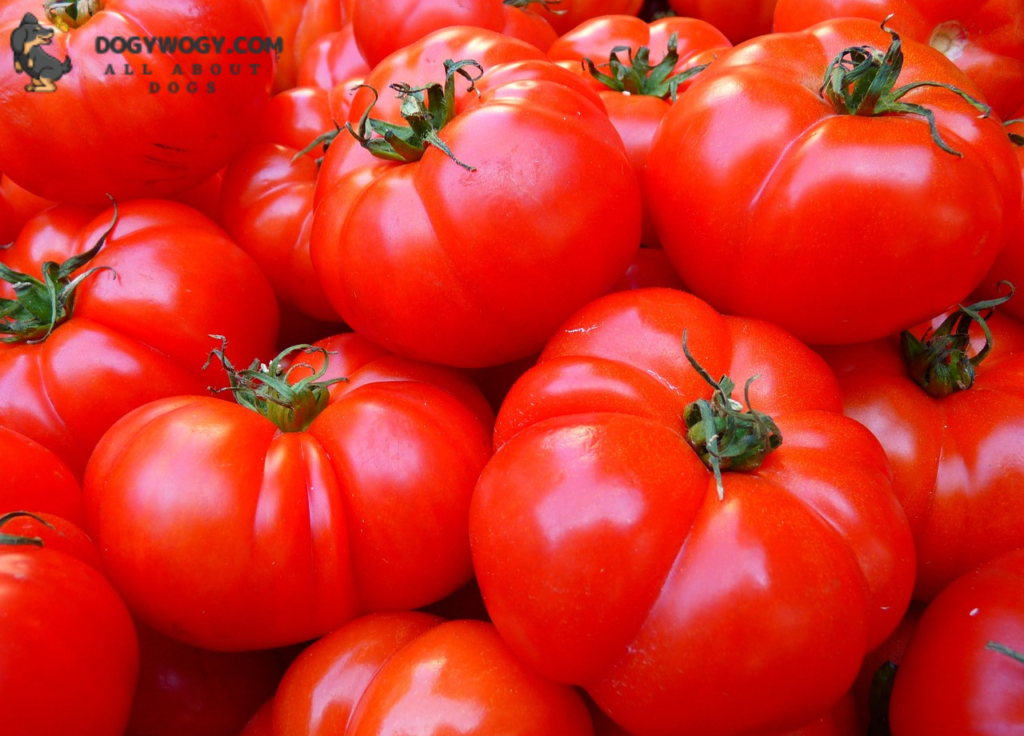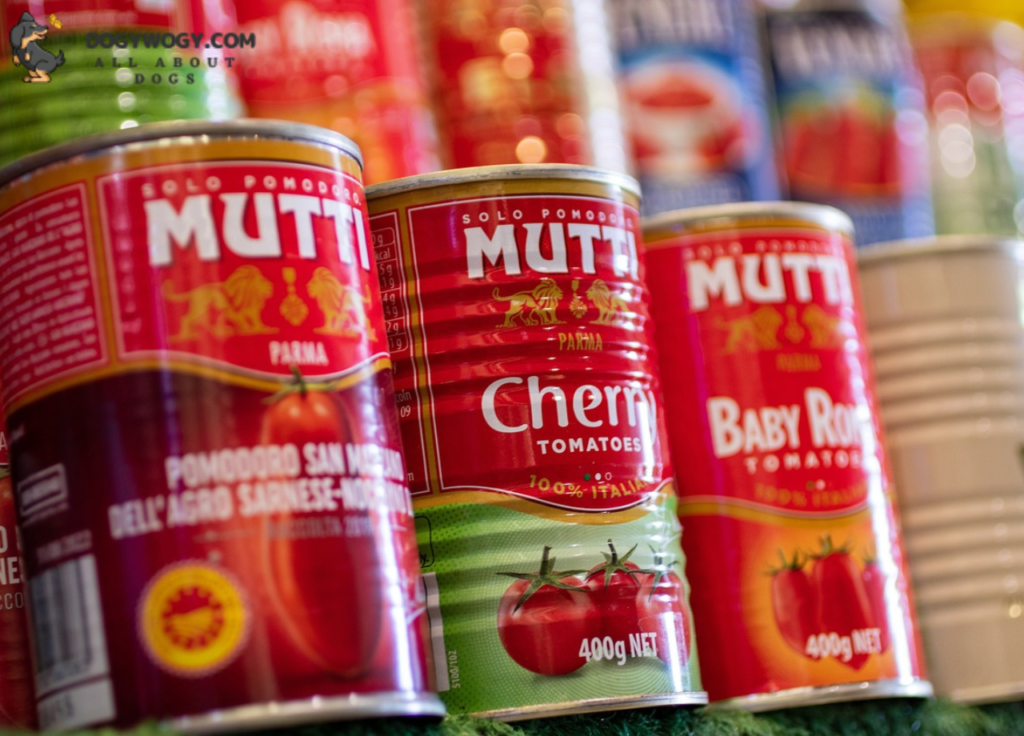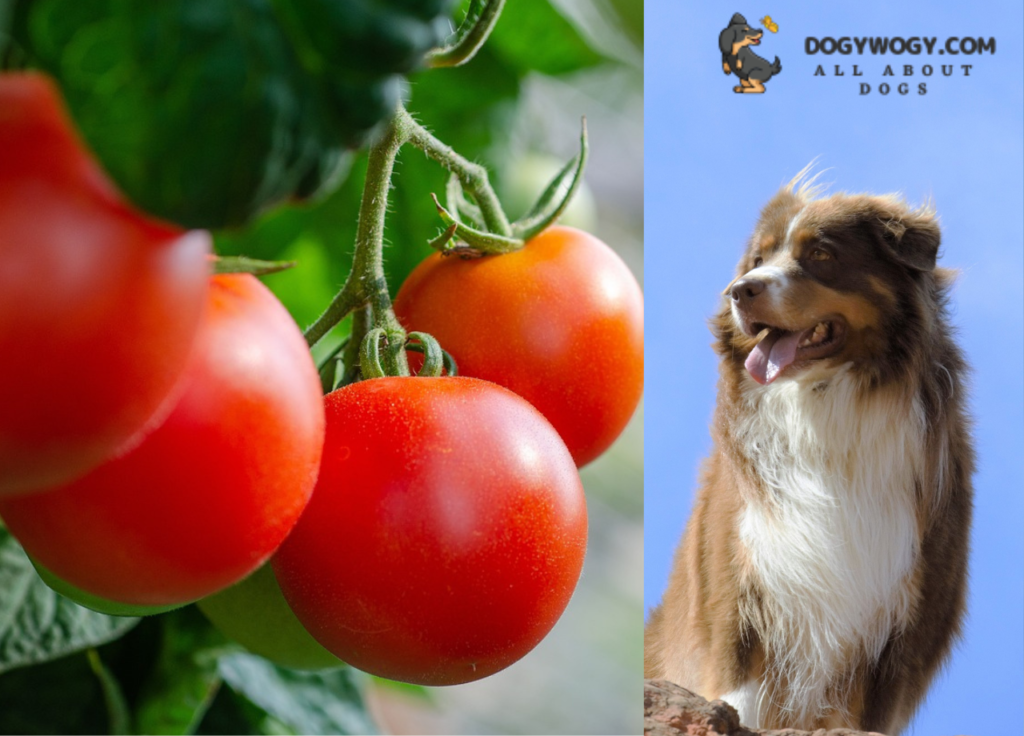Can dogs eat tomatoes? Pet owners often ask this question. The answer is yes, but only ripe tomatoes. Green tomatoes, stems, and leaves can be toxic to dogs, so only give them ripe tomatoes in moderation.
There’s a misconception that tomatoes are poisonous to dogs. It’s not true, but knowing the dangers of green tomatoes stems, and leaves is important. There’s a substance in these parts of the plant called solanine that’s toxic to dogs.
It’s important to provide accurate information about the food we feed our pets. This is especially true regarding fruits and vegetables since many can be toxic to dogs. Providing our dogs with the right diet can ensure their health and happiness.
We will talk about dogs and tomatoes in this blog post, clearing up some misconceptions surrounding this popular food. By providing accurate information, we help responsible dog owners make informed decisions about the foods they feed their pets. Dogs can eat tomatoes as long as they are not overfed. The vitamins and minerals in tomatoes are excellent for keeping dogs healthy.
How Are Tomatoes Good For Dogs?
The reasonable use of tomatoes in a dog’s diet can benefit them. There are many reasons dogs can eat tomatoes, and here are some of them.
The nutrients in tomatoes, such as vitamin C, promote a healthy immune system. This nutrient strengthens a dog’s natural defenses, protecting them from various illnesses and infections. Tomato is also a good source of lycopene, an antioxidant that promotes heart health and may reduce cancer risk. As a result of their fiber content, tomatoes are beneficial to dogs’ digestion, preventing constipation and promoting regular bowel movements. Moreover, tomatoes are low in calories, making them a healthy alternative to high-calorie treats, which can help obese dogs lose weight. Despite this, it’s important to remember that only ripe red tomatoes should be given to dogs. The leaves and stems of green tomatoes should be avoided since they contain solanine, which can harm dogs. To avoid adverse reactions, introduce tomatoes gradually to your dog’s diet.
What Types Of Tomatoes Can Dogs Eat?

Selecting the type of tomatoes dogs can safely consume is essential when feeding them tomatoes. A dog can eat ripe red tomatoes without harm. It is safe for dogs to enjoy these juicy, flavorful fruits in moderation. Green, unripe tomatoes should be avoided as they contain high levels of solanine. This toxic substance is harmful to dogs.
Additionally, dog owners should not give their dogs tomato leaves or stems as they contain solanine. Only offer meaty portions of ripe tomatoes to your furry friend to ensure their safety. If you plan to feed your dog tomatoes, make sure that the leaves, stems, and green parts are removed. Introducing tomatoes gradually to your dog’s diet is a good idea to avoid any reactions. If you know the types of tomatoes your dog can eat, you can provide them with a tasty and healthy treat.
What is Tomatine Poisoning?
Tomatine poisoning is a real concern when it comes to dogs and tomatoes. Tomatine, a substance found in ripe red tomatoes, can harm dogs when consumed in large amounts. Various parts of the tomato plant contain tomatine, including leaves, stems, and unripe green tomatoes. A dog can become poisoned by Tomatine if they consume excessive amounts. There are several symptoms of tomatine poisoning in dogs, including vomiting, diarrhea, lethargy, weakness, and even changes in heart rate. See a veterinarian as soon as possible if your dog exhibits these symptoms after ingesting tomatine-containing parts of the tomato plant or unripe tomatoes.
Tomatine poisoning may lead to the following symptoms in your dog:
- Diarrhea
- Vomiting
- Loss of coordination
- Loss of appetite
- Muscle weakness
- Hypersalivation
- Dilated pupils
- Tremors
- Seizures
- Lethargy
- Abdominal pain
- Cardiac effects
A veterinarian can evaluate your dog’s condition, provide supportive treatment, and monitor their recovery. It’s important to only give dogs ripe, red tomatoes and avoid giving them leaves, stems, or unripe tomatoes to prevent tomatine poisoning.
When Should Dogs Avoid Tomatoes?
Can dogs eat tomatoes? Yes, but precaution is necessary in some cases.
The high acidity of tomatoes should be avoided by dogs with pre-existing health conditions, such as kidney disease or pancreatitis. The acidity of tomatoes can complicate these conditions and make dogs uncomfortable.
A dog with known allergies or sensitivities to tomatoes should also not consume them. It is possible for allergic reactions to manifest as skin irritations, digestive upsets, or respiratory problems.
Recommended: Can Dogs Eat Marshmallows?
A dog with gastrointestinal issues or a sensitive stomach may benefit from skipping tomatoes altogether, as they can sometimes cause digestive disturbances such as vomiting or diarrhea. Similarly, pregnant dogs and dogs nursing puppies should avoid tomatoes since they may cause stomach upset or gastrointestinal problems in the puppies.
Always consult a veterinarian before adding tomatoes to a dog’s diet, especially if there are underlying health concerns. Keeping these situations in mind is a great way to ensure your dog’s comfort and well-being.
How to Feed Tomatoes to Your Dog
It is always a good idea to consult your veterinarian before serving tomatoes to your dog so that you can determine the correct portion size. A healthy treat like tomatoes should be part of your dog’s optimum daily balanced diet.
- It is better to give smaller portions to smaller dogs. You can feed your dog one large or two small ripe red tomatoes each week, but start with a smaller amount to see if it reacts negatively.
- Whenever possible, choose organic tomatoes. Whether organic or conventionally grown, always wash tomatoes thoroughly before serving.
- You should always choose organic tomatoes when possible. Wash tomatoes thoroughly before serving, regardless of whether they are organic or conventionally grown.
- Cut washed fruits into bite-sized pieces (smaller pieces for smaller dogs to prevent choking hazards).
- Prepare your dog’s regular food by cooking, mashing, or pureeing it. The antioxidant lycopene in cooked tomatoes is more easily absorbed than in raw tomatoes.
- Never give your dog onions or garlic with tomatoes, as these can be toxic and cause stomach upset. Tomato sauces prepared from canned or jarred (such as pasta or ethnic dishes) are strictly prohibited.
Can Dogs Eat Tinned Tomatoes?

Caution must be considered when evaluating the safety of tinned tomatoes for dogs. Tinned tomatoes pose some concerns, even though dogs can consume ripe, fresh tomatoes in moderation. Many ingredients, such as salt, seasonings, and preservatives, are not suitable for dogs in tinned tomatoes. These additives could upset a dog’s stomach or cause other adverse reactions. A dog with a sensitive stomach may experience digestion problems due to the high acidity levels in tinned tomatoes. Be sure to read the labels carefully and avoid canned tomatoes with ingredients that could harm your dog. Consult a veterinarian before introducing tinned tomatoes to a dog’s diet to ensure they are safe.
Conclusion
Can dogs eat tomatoes? Yes, but only ripe tomatoes. It is important to give dogs ripe tomatoes only in moderation, as green tomatoes and their stems and leaves are toxic.
The nutrients in ripe tomatoes include vitamins A, C, and K, potassium, and fiber. Their effects can also be attributed to improving digestion, boosting the immune system, and preventing skin and coat problems.
However, you should first give your dog a small amount and watch how they react before giving them more. Consult your veterinarian if you observe any signs of discomfort in your dog, such as vomiting, diarrhea, or lethargy.
Generally, ripe tomatoes make a good snack for dogs when consumed in small amounts. It is important to avoid feeding them green tomatoes or tomato stems and leaves since they are poisonous.

